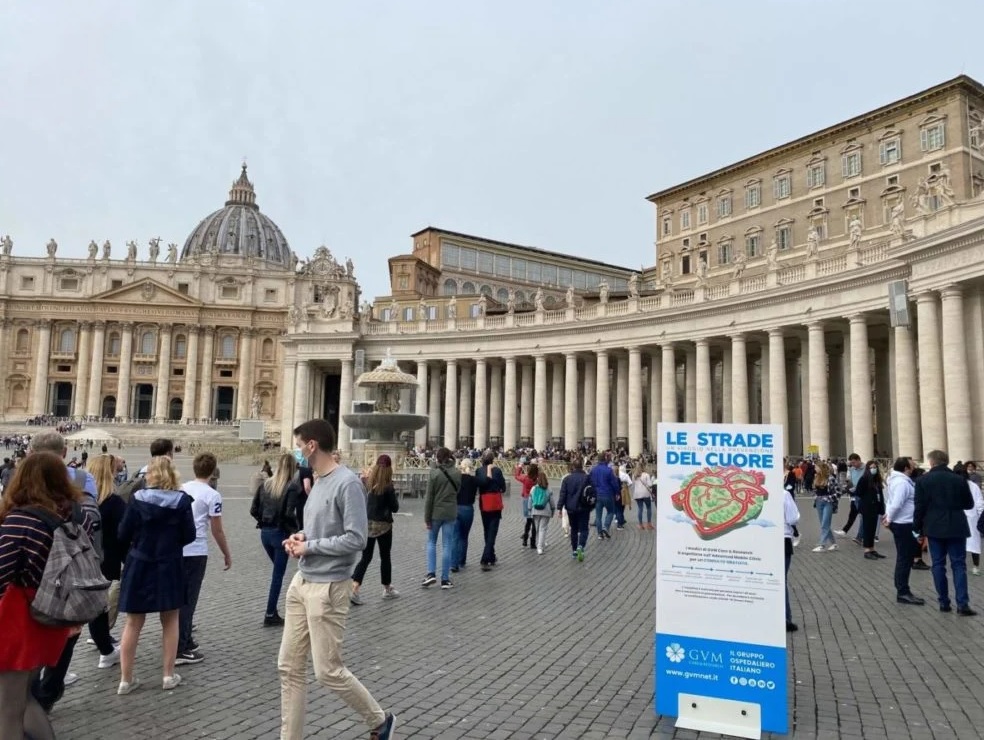
In St. Peter's Square a mobile clinic for prevention dedicated to the most needy
A mobile clinic in St. Peter’s Square: the ‘Roads of the Heart’ tour of the Gvm Care & Research group has made a stop in the Vatican in collaboration with the Apostolic Electoral College
Cardiovascular examinations were carried out, as well as wide-ranging general medicine consultations “for those who do not have the possibility of ‘normal’ access to care”.
The itinerant initiative dedicated to cardiovascular health, ‘The Roads of the Heart’, after the success of the three days in Piazza del Risorgimento, arrived in St. Peter’s Square with a special stop made possible thanks to collaboration with the Apostolic Elemosyneria, the Office of the Holy See that exercises charity towards the poor on behalf of the Supreme Pontiff.
The doctors of Gvm Care & Research, on board the Advanced Mobile Clinic, performed consultations all day today in the mobile clinic dedicated exclusively to those most in need
For this special stop, the teams of cardiologists from the San Carlo di Nancy Hospital and Tiberia Hospital in Rome, together with a multidisciplinary team, provided not only cardiovascular examinations but also general medicine consultations on a broad spectrum.
Professor Giuseppe Speziale, vice-president and coordinator of Cardiac Surgery at Gvm Care & Research, explained the importance of cardiovascular prevention: “Covid has ‘broken’ the concept of prevention, which is the key to fighting all diseases, especially cardiovascular diseases that are preventable and yet still represent the majority of causes of death in Italy.
For this reason, I repeat, it is essential to return to prevention.
We are a hospital group present in many regions of Italy and we have set up this tour in the squares offering free checks to help bring people closer to screening. One out of every two screenings today is missing, so it is clear that a lot has been lost.
It’s a race against time, and especially in heart disease, whoever is quicker wins.
A mobile clinic because health is everyone’s right
Health is everyone’s right, which is why the Hospitaller Group, with offices throughout Italy, strongly supported this event, which was also created in collaboration with the Apostolic Electoral College.
“The people most in need generally do not have the possibility of ‘normal’ access to care.
They are the ones we want to meet with this initiative – underlines Professor Speziale -.
This day was also conceived at the instigation of the Holy See, in the person of the Holy Father, whom we thank for allowing us to be here with our mobile clinic to serve the poor.”
Speziale is optimistic about the possibility of following up these patients over time, and above all about the possibility of a second edition next year: “We hope to return to this square again next year, but these screenings serve to intercept what needs to be done in the immediate future for these patients.
Gvm is also present in the city of Rome with five hospitals, so all the people who will need will be welcomed with open arms in our facilities”.
Dr. Veronica Ojetti, Director of the Complex Operative Unit of Internal Medicine and Emergency Room, San Carlo Nancy Hospital in Rome, underlines how cardiovascular diseases are another real health emergency.
“As we know, cardiovascular diseases such as heart attack and stroke are the first cause of death in our country so it is very important to do prevention.
It must be said that there are non-modifiable risk factors such as age, male gender and non-Caucasian race, and other modifiable risk factors. On these we have to act and that’s where the importance of doing prevention comes from.”
The expert also explains how the teams at work act in detail: “The first thing to do is to assess the risk of hypertension and then, to patients who join the initiative, we measure blood pressure.
Another risk factor is hypercholesterolemia and in fact the patient undergoes cholesterol and triglyceride measurements.
The other risk factor to be calculated is diabetes and in the mobile clinic the patient’s blood sugar is measured. Already starting from the result of these three factors, the doctor is able to know what is the risk and consequently help the patient, in this case in need, who often does not have a general practitioner and has difficulty in buying drugs.
For this reason, our multidisciplinary team, having detected these parameters, prescribes drugs and advises during the interview an adequate diet.
We know in fact that the Mediterranean diet is important in the prevention of cardiovascular risk and consists in the intake of fruits, vegetables and carbohydrates.
Our initiative should help these patients understand that risk factors can be modifiable and consequently lower their chance of getting sick.”
How many diagnoses have been missed due to the Covid-19 health emergency and what to expect in the near future?
“Only in the next few years will we understand the extent of this – adds Ojetti -, there has been a lack of monitoring of parameters such as blood pressure, diabetes and cholesterol.
Another big problem has been sedentariness because walking is already prevention.
The pandemic indirectly led to weight gain in many cases and cases of overweight and obesity are not uncommon even in children. The child will be the adult of the future.
Today we must work to fill the gap due to the pandemic,” concludes Ojetti.
Read Also:
South Sudan, Mobile Clinics Of Doctors With Africa Cuamm To Help Displaced Populations
Mobile Clinics: Paramedics Delivering Health In Some Worlds’ Worst Crisis?


